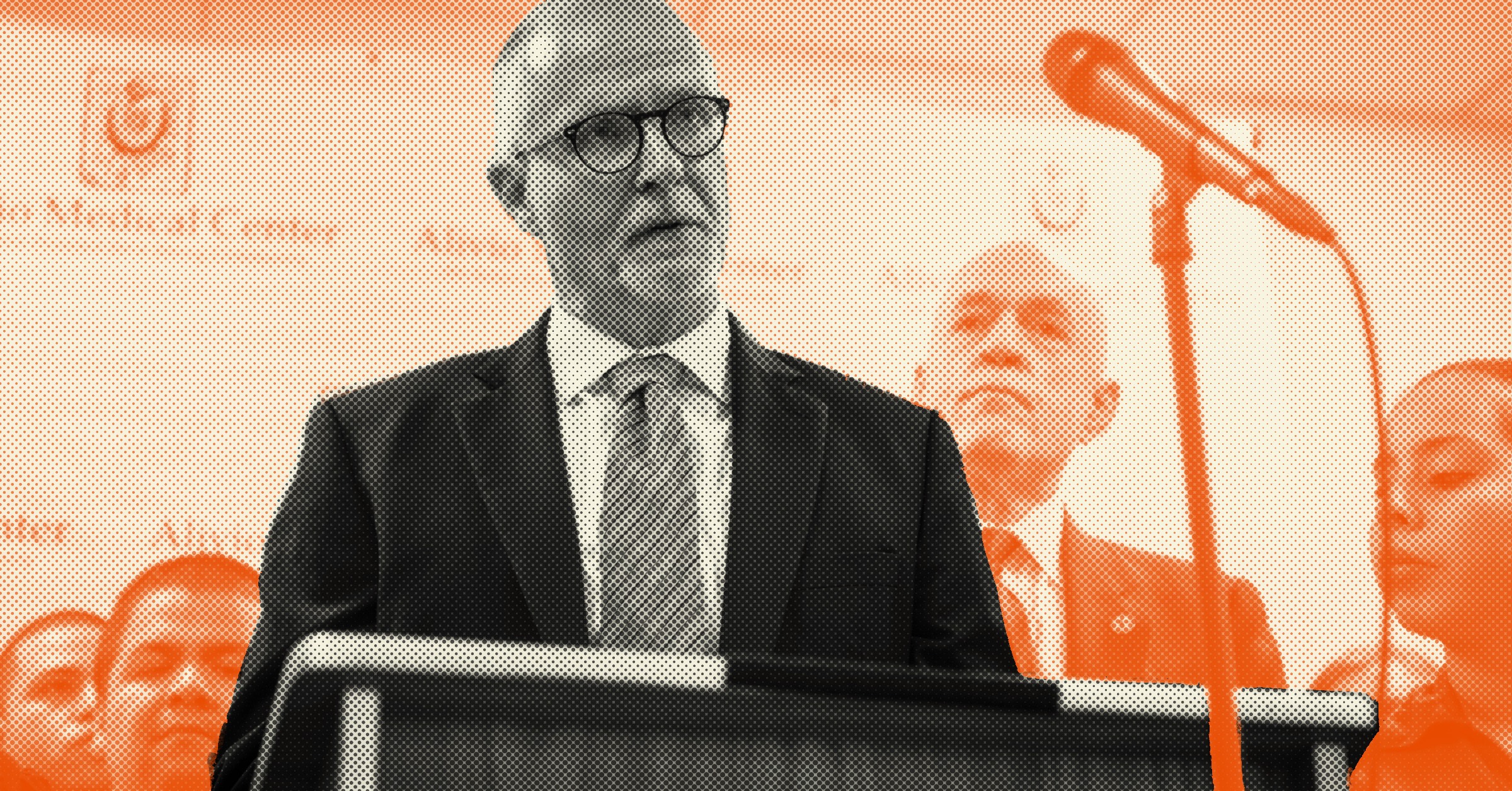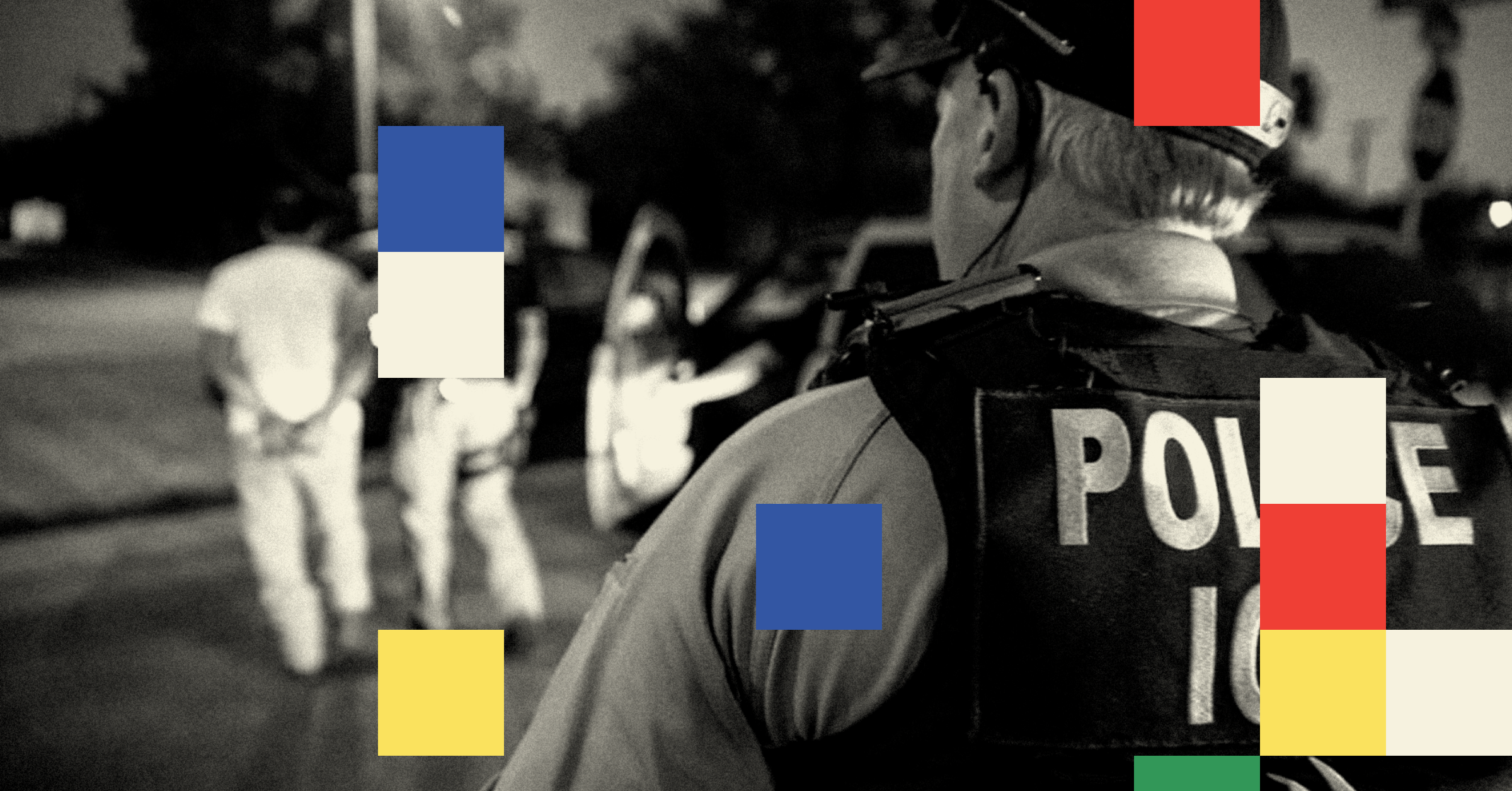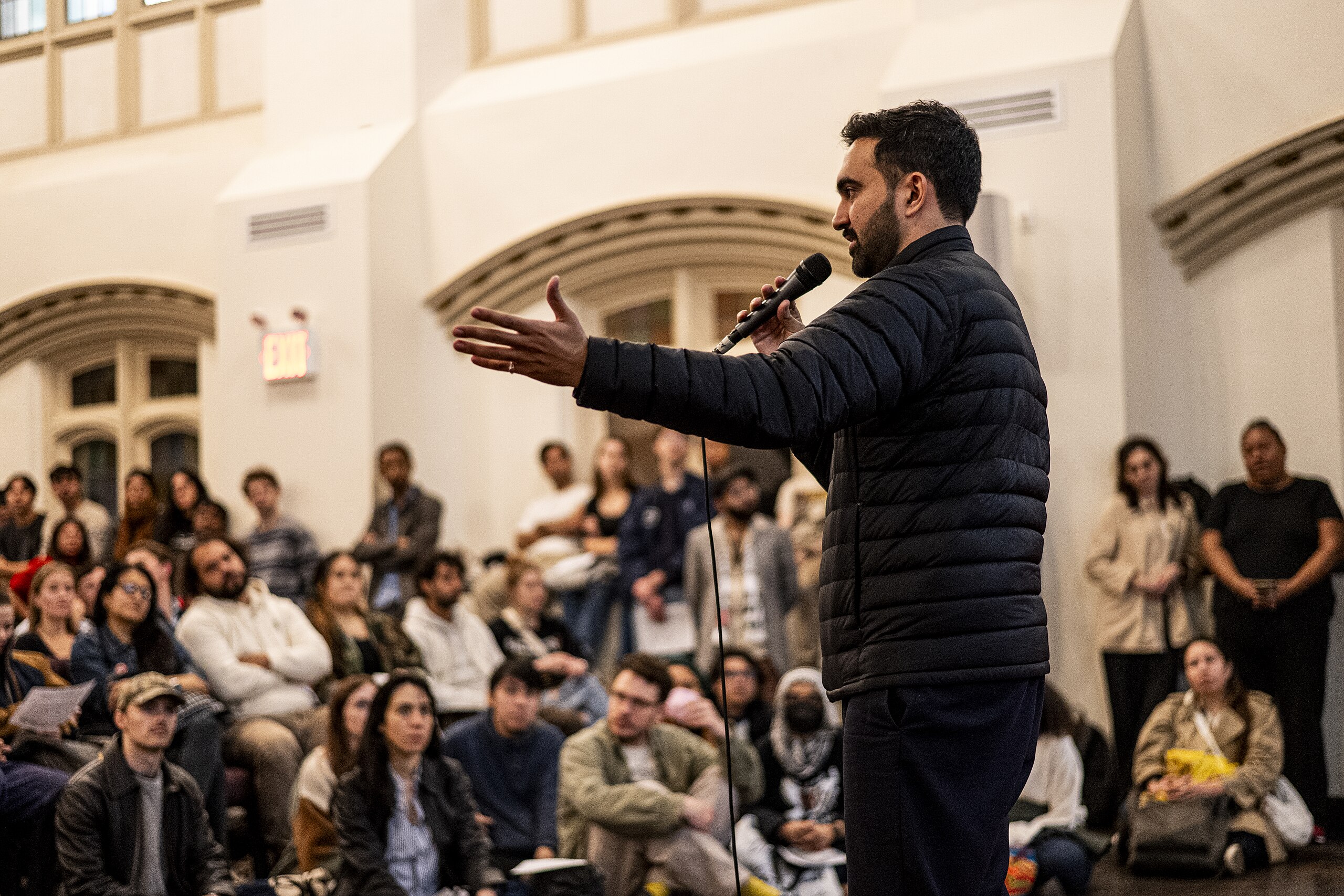Forty years after Harold Washington’s monumental victory in 1983, Chicago finds itself in a similarly polarizing and potentially paradigm-shifting mayoral election. Incumbent Mayor Lori Lightfoot, the city’s first Black woman and first lesbian mayor, was knocked out of the election after finishing third out of nine candidates in the first round in February. Lightfoot was outflanked in the election by Paul Vallas, who ran to her right, and Brandon Johnson, who ran to her left, leaving her with a humiliating 17% of the vote after previously winning 70% of the vote in the 2019 runoff.
Lightfoot ran in 2019 as a good government liberal but mostly governed as a neoliberal centrist like her predecessor Rahm Emanuel. Lightfoot was in part the victim of circumstance, spending most of her term running the city during an unprecedented pandemic which in turn came with an uptick in violence in an already extremely violent city. But Lightfoot was also a victim of her own personal political ineptitude, picking fights she couldn’t win and alienating many of her key allies in the city council.
For many in Chicago, Brandon Johnson’s campaign represents a hope for a better city not felt since Washington. Johnson, a former public school teacher and staff organizer of the Chicago Teachers Union, defeated a more conservative Democratic incumbent to be elected as a Cook County Commissioner in 2018. The powerful union, along with the state and national teacher unions, are the bedrock of Johnson’s campaign, and lead a coalition of supporters that include the city’s other major public sector unions and numerous progressive organizations. Johnson is running on a platform of social investment, taxing the rich, and taking a “smart” approach to crime, in particular through expanding non-law enforcement mental health crisis intervention (“Treatment Not Trauma”) and reopening the city’s closed public mental health clinics.
Paul Vallas, who was CEO of Chicago Public Schools in the 90s, has been running from day one on law and order. In an election where “crime” has been the major issue, Vallas’ message discipline around crime paid major dividends in the first round, with Vallas coming in first with 36% of the vote. Vallas also benefited from being the only white candidate in the race, whereas when he ran 2019 he came in 9th place in a field of 14 total candidates, five of whom were white. Vallas’ base of support is white voters, in particular white voters in city wards with precincts that vote overwhelmingly Republican. The same wards are also home to most of the city’s police officers. Vallas has the backing of the Fraternal Order of Police, which just re-elected John Catazarana as its president, an election-denying, Jan 6th-supporting MAGA conservative.
Unlike Washington in the 80s, Johnson did not win a plurality in a single Black ward (Lightfoot won those wards) in the first round. Instead, Johnson’s base of support came from nine Northside wards with strong progressive voter bases that are also some of the most racially heterogeneous wards in the city. Also unlike with elections in the 1980s, turnout in the February election this year was a dismal 36%, just a point higher than in 2019. Turnout among young voters, a demographic likely to go strongly for Johnson, had particularly dismal turnout in the first round with 18-24 year olds only casting 3% of total ballots.
Paul Vallas is a Republican?
Johnson’s campaign’s major line of attack against Vallas in the runoff, similar to attacks Lightfoot made against Vallas in the first round, has been “Paul Vallas is a Republican.” It’s not a claim made out of thin air. In 2009 Vallas considered running for Cook County Board President as a Republican, saying in an interview that he’s “more of a Republican than a Democrat.” Just over a year ago Vallas was a regular poster in a Chicago GOP facebook, appeared on a conservative AM radio show where he criticized Obama and Biden, and just last year was a guest at a fundraiser hosted by the radical right-wing organization Awake Illinois which has emerged has a leading anti-LGBTQ hate group in the state. In addition to being supported by the local FOP, Vallas has been endorsed by 2022 Illinois Republican candidate for Governor Darren Bailey, and many of his largest campaign donors regularly spend billions supporting Republicans. Even Betsy Devos’ SuperPAC has thrown itself behind Vallas in the last week of the election. Vallas has also regularly attacked Johnson as a police “defunder” and said that CTU had abandoned children during the pandemic, lines of attack commonly used by Republicans in recent years.
In a city that just a few months ago voted to re-elect a Democratic governor 4-1, it’s easy to see why Johnson’s campaign is trying to paint Vallas as not only a Republican but as full MAGA. But it’s also fundamentally untrue. Vallas is a Democrat. Voting records show that he has always voted in Democratic primaries, and he was the Democratic party’s nominee for Lieutenant Governor in Illinois just nine years ago. Numerous Democrats have endorsed his mayoral campaign, including the second most powerful Democrat in the senate Dick Durbin, several members of the city council’s Black caucus (all Democrats), and the extremely popular former Illinois Secretary of State Jesse White. Most importantly though, Vallas owes his career to the kindness of powerful Democrats who appointed him to major governmental positions.
Vallas got his start in politics in 1980 as an analyst in the office of Illinois’ Senate president Democrat Philip J. Rock. Vallas was directed to the position by Sam Maragos, a family friend and former Democratic member of the state general assembly. Six years later, Vallas would land a job as director of the Economic and Fiscal Commission, a nonpartisan research agency of the state legislature. It was in that role that Vallas caught the eye of Chicago’s Democratic Mayor Richard M. Daley, who would go on to appoint him as city revenue director in 1990 and then city budget director in 1993.
In 1995, the GOP-controlled state legislature, with Daley’s support, gave Chicago’s mayor sweeping control over Chicago Public Schools, including the ability to appoint the school board presidents, its members, and the new position of district CEO. Daley appointed Vallas as CPS’s first CEO, a position he held until 1999. To balance the district budget, Vallas rolled out a number of cuts including 1,700 layoffs and a pension holiday. During his tenure, Vallas took a punitive approach towards low-performing schools, ended social promotion and increased standardized testing, and oversaw the creation of the city’s first 15 charter schools. Vallas also engaged in dangerous financial gimmicks, with CPS issuing $666 million in capital appreciation bonds under his tenure that would end up costing 1.5 billion in interest payments to major Wall Street banks.
Vallas resigned as CEO in 2001 after a drop in test scores and Daley’s suspicions grew that Vallas was putting his own political aspirations first. After a failed run for Governor in 2002, Vallas was given his next post by a School Reform Commission created by the Republican state legislature that had taken control of Philadelphia schools. As CEO of the Philadelphia School District, Vallas oversaw the privatization of 42 public schools, increased standardized testing, and created “zero tolerance” discipline policies. He left the district in 2007 with a major budget deficit, but was quickly recruited to his next job by Louisiana’s Democratic governor Kathleen Blanco to carry out a similar campaign of school reform in New Orleans in the wake of Hurricane Katrina. Following his hollowing out of New Orleans’ public schools (which are now all charters), Vallas was recruited to lead similar smash and grab overhauls of public schools in Haiti and Chile in the wake of their respective earthquake disasters in 2010.
Neoliberalism, Chicago Style
A recent article in the Sun Times comparing Vallas to Brandon Johnson described Vallas as “the ultimate technocrat” who aims to “solve societal problems with a sort of scientific approach”. While the press will note Vallas’ support for school choice and “tough on crime” stance on policing, he is generally described as a wonky, by the numbers problem solver rather than some sort of ideologue. What’s been missing from the narrative of Chicago’s 2023 election is the story of the neoliberal turn and Paul Vallas as one of its most beloved administrators.
For nearly half a century the corporate class has been on the march. The economic downturn and stagflation crisis of the 1970s created an opening to strike back against organized labor and to reverse the gains the working class had made since the New Deal. Neoliberalism — at its core the idea that social prosperity can only be achieved through total subservience to market forces — provided a theoretical basis for policies designed to decimate the power of labor and the public sector. By the 1990s, neoliberalism became so dominant that the Democratic Party came to accept that there was “no alternative”. In Chicago, Mayor Daley followed the lead of President Clinton and became the capitalist class’s “steward” for enacting sweeping neoliberal changes, from privatization to tax giveaways to corporations and developers to the destruction of public housing and militarized policing.
It’s no surprise then that Daley prized Vallas as administrator. Vallas, who said that CPS had to “evolve and become more like a corporation,” has never been interested in improving public education but in undermining it and transforming it into just another market for capital to conquer. Whatever attempts Vallas would make if elected mayor to reduce violence in the city would be limited by his commitment to preserving an economic order that is dependent on structural inequality and the enforcement of private property rights by any means necessary. But one of the major successes of neoliberalism is how the movement’s ideology has been accepted as “common sense” and its origins as a class project made largely invisible. Instead, any analysis of Vallas is a series of facts and simplistic labels like “moderate” or “centrist”.
The Alternative
But it’s not the 90s anymore. Daley’s popularity had finally started to slip when he called it quits in 2011, and his successor Rahm Emanuel, despite his positive association with President Barack Obama, also quickly became unpopular, opting to leave office rather than run for a third term in an election he was likely to lose. Lightfoot, who much more than Daley or Emanuel projected a liberal facade, proved to have even worse luck. More and more Chicagoans have started to smell the shit.
An alternative politics has also emerged, as most visibly articulated by the Chicago Teachers Union. Since its takeover by the Caucus of Rank-and-File Educations (CORE) in 2010, the CTU has been transformed into a militant union, waging massive strikes in 2012 and 2019 over “common good” demands that have helped the union build community support across the city. The union has also been able to make major political interventions, most notably with the passage of an elected school board bill in Springfield (despite Lightfoot’s protests) and by electing allies to seats in congress, the state assembly, the county board, and city council (including all the council’s socialists). Thirteen years since CORE’s first victory, CTU now has one of their own in a mayoral runoff, with Brandon Johnson’s brand of left-liberal progressive politics as the sharpest challenge to the city’s neoliberal order that’s ever taken place at the ballot box.
In the face of that challenge, capitalist class forces are desperately trying to shore up support for Vallas. Not only have they poured in millions and millions to elect Vallas and oppose Johnson, but they’ve also called upon as many of their Democratic Party proxies as possible to endorse Vallas. Clearly “Paul Vallas is a Republican” is proving to be an effective message among the city’s liberal Democratic voters. Polling also shows that Johnson looks likely to secure the city’s Black vote. The election will be close and Johnson could very well come out on top.
Party vs. Party or Class Against Class?
“Paul Vallas is a Republican” may be an effective message for securing a majority of voters in the short term but it’s a message that will evaporate as soon as Johnson is elected. Any attempt by Johnson to carry out his agenda in office will be met by the full-throated opposition of capital. Johnson will also lack a progressive majority in the city council and will be under immense pressure to make concessions in order to pass legislation. To prevail Johnson will need the city behind him, ready to withstand attacks and mobilize in support of his political program. To mobilize support at the scale and for the length needed to win these trials Johnson will need to name the enemy for what it is, and the enemy will not be the GOP.
Speaking at a rally with Johnson this past Thursday, Senator Bernie Sanders put the mayoral election in very clear terms: “the fundamental issue is what side are you on? Are you on the side of working people or are you on the side of the speculators and the billionaires?”
For socialists and our progressive allies, our message has to transcend the simplistic Republican vs. Democratic divide that is so often propped up as the fundamental political conflict in our country. The actual fundamental conflict in our society is the one between those of us who work for a living and those who live luxuriously off exploiting the labor of others. The capitalist class obscures this conflict through a divide and conquer strategy built on white supremacy, heteropatriarchy, nationalism, and many other oppressive forms. The capitalist class also obscures this conflict through the Democratic and Republican parties.
It is our task to expose the contradictions in all of these structures and to point instead towards political formation on a class basis. The modern Republican party might be moving closer and closer to outright authoritarianism, but the Democratic party’s surrender to neoliberalism is part of what made that rightward ascent possible. And while many American voters may see the divide between the two parties as the fundamental conflict, most Americans don’t bother to vote at all. The people we most need to win over to our side are the vast majority that are deeply cynical about politics, who feel like nothing ever changes no matter which lever they pull.
Socialists in the United States cannot compete on the present terrain of political struggle. We must transform the terrain itself, and to do so we must articulate the need for independent, class-based organization as a direct counter to both parties. Because only a multi-racial, multi-generational, and ultimately multinational working class movement with the explicit goal of socialist transformation will be able to defeat the forces of capital, the most organized and powerful social force in history.
The mayoral election this year will be a major structure test for Chicago’s counter hegemonic forces. Johnson’s campaign has proved extremely successful at building a large coalition united behind a vision for a better Chicago. What remains to be seen is if that coalition is large enough to be decisive at the ballot box and if it will stay unified in support of a truly transformative program if Johnson is elected. Regardless, the political shift that brought us to this point has been seismic. Socialists across the country should have their eyes on Chicago.




